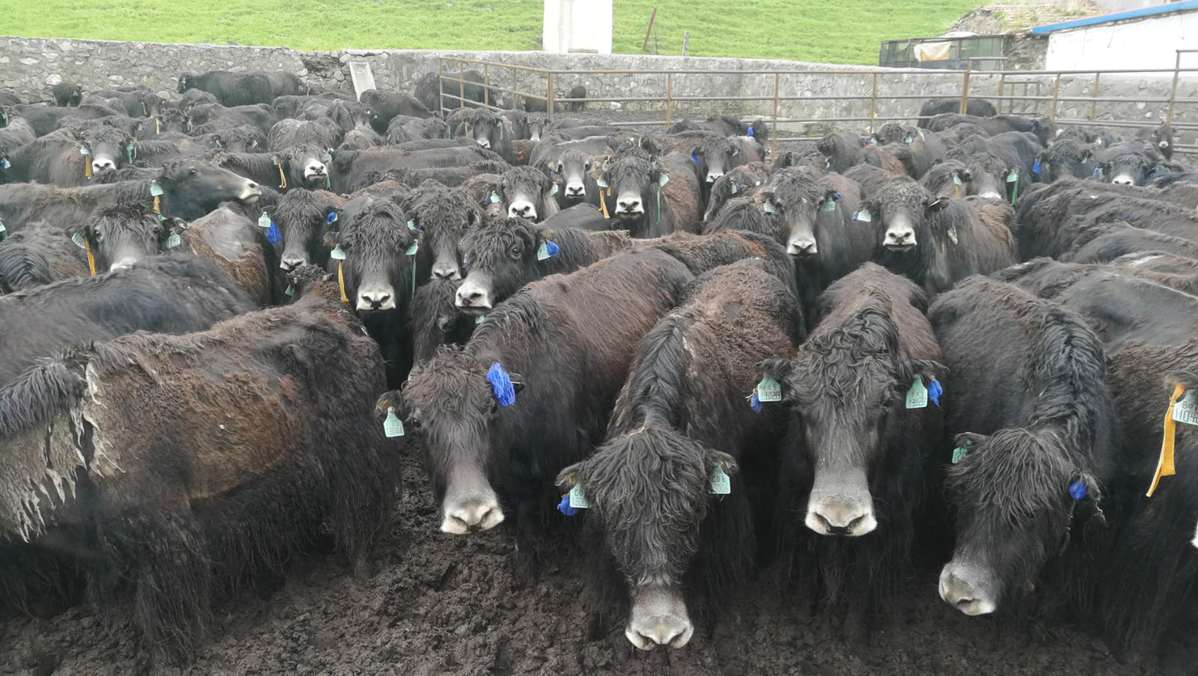New yak breed brings herders renewed hope


Scientists have spent years propagating the hornless species to improve livestock and livelihoods
Under the touch of petite scientist Yan Ping, a tall and powerful black yak, weighing more than 400 kilograms, becomes as obedient as a lamb.
Unlike other yaks, this one has no horns. It is a new breed cultivated by Yan and her team from the Lanzhou Institute of Husbandry and Pharmaceutical Sciences at the Chinese Academy of Agricultural Sciences. It is expected to help herdsmen on the Qinghai-Tibet Plateau, known as the "roof of the world", out of poverty.
Yaks without horns
It took more than 20 years for Yan's team, working with Datong Yak Breeding Farm in Northwest China's Qinghai province, to breed the Ashidan yak, which is named after the 4,380-meter Ashidan Mountain that looms over the farm.
"The Ashidan yak has no horns and a mild temperament, so it is easier to keep and feed in the stalls," Yan said.
"It is better suited for large-scale intensive breeding in the cold and arid alpine areas of China. We can make full use of feed resources in the alpine, semi-agricultural and semi-pastoral areas of the Qinghai-Tibet Plateau."
Traditionally, yaks grazed seasonally on the Qinghai-Tibet Plateau. Yan said that grazing, supplementary feeding and whole-house feeding can be combined to increase yak breeding for all seasons.
Naturally, about 6 or 7 percent of the yaks in Qinghai are born without horns and these were selected for the breeding program. Scientists identified the genes related to horns and cultivated the Ashidan yak using molecular breeding technology. Each Ashidan yak has a similar physique and appearance, and is genetically stable.
Under the same feeding conditions, the average reproductive rate of the Ashidan yak is 59.98 percent, which is 11.72 percentage points higher than that of local yaks, and the mortality rate is at 1.24 percent, 4.32 percentage points lower than that of local yaks, according to the research team.
The Ashidan yak was also bred to improve meat production. Close to 4,000 male Ashidan yaks have been introduced to Qinghai farms to improve livestock.
Statistics show that the average weight of the Ashisan yak at 18 months old is 92.77 kg, heavier than a local yak by 24.71 percent.
- At least 13 dead as major fire breaks out in northern HK housing estate
- Ministry kicks off a campaign to crack down on misconduct in academic papers
- China opposes official interactions, military ties between US, China's Taiwan region: spokesperson
- Xinshengwei Yangtze River Bridge opens in Nanjing
- Mainland slams recent Japanese govt statement on Taiwan
- Former vice-education minister sentenced to 15 years for bribery





































